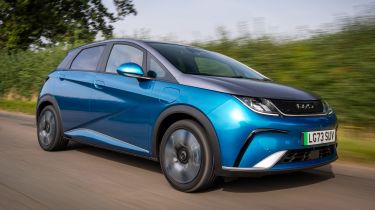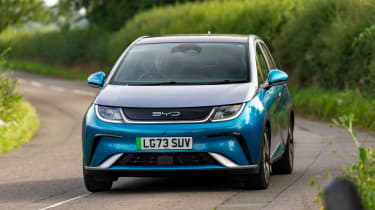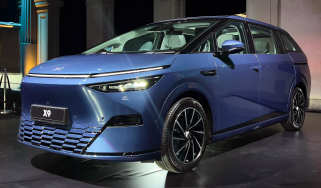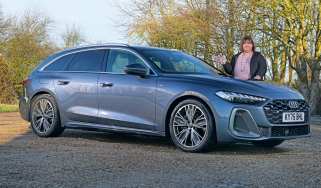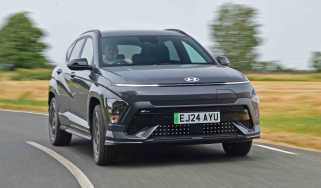BYD Dolphin review
The BYD Dolphin doesn’t excel when it comes to driving thrills, but higher trim versions are brilliant value for money

Our opinion on the BYD Dolphin
The BYD Dolphin is one of the best-value electric hatchbacks around. It doesn’t feel like a low-cost product thanks to its pleasant interior and impressive battery, but aggressive finance packages mean that it undercuts numerous other EVs when it comes to monthly costs. It’s not all that great to drive, but it is reasonably comfortable and has enough space in the cabin to work as a family car. Rivals like the Renault 5 and MG4 are more fun and stylish, but if you don’t care about that, the Dolphin is the pragmatic choice.
|
Key specs | |
| Fuel type | Electric |
| Body style | Hatchback |
| Powertrain | 60kWh battery, 1x e-motor, front-wheel drive |
| Safety | 5 Stars (Euro NCAP, 2023) |
| Warranty | 6yrs, 150,000 km (93,750 miles) |
About the BYD Dolphin
The BYD Dolphin range now consists of just two trim levels: Comfort and Design. There were four trim levels originally, with the entry-level Dolphin Active costing around £26,000. However, the remaining models are higher-spec cars with greater battery capacity, so Dolphin prices now start from over £30,000.
Every Dolphin comes with a 12.8-inch infotainment screen, vegan leather upholstery, metallic paint and alloy wheels. While axing the lower-spec models has driven the price up, this does mean that posher touches are included, such as folding door mirrors, heated front seats, rear USB ports and a heat pump.
Underneath, both the Comfort and Design models come with a 60.4kWh battery and a 201bhp front-mounted motor. Regardless of your chosen variant, the Dolphin has a WLTP combined range figure of 265 miles on a single charge. 110kW DC rapid charging means a 10 to 80 per cent top-up can be completed in 26 minutes.
BYD Dolphin prices and latest deals
Performance & driving experience
|
Pros |
|
| Cons |
|
Originally there were three powertrain combinations in the BYD Dolphin, but now only the most potent powertrain remains, and this consists of a 201bhp motor alongside a 60.4kWh battery.
You can easily provoke wheelspin from the 201bhp powertrain if you press the pedal too hard from a standing start, but this doesn’t really mean it’s all that much fun. Instead, it’s just a useful amount of additional power to help get up to speed faster when needed. As with most electric cars, the motor is very quiet – there’s a typical whine, but it’s all in the background and isn’t so intrusive that it stops the Dolphin from being relaxing to drive.
Since the Dolphin is an electric vehicle (EV), there are no gearbox options; it utilises a single-speed setup, making driving in traffic very easy.
Performance, 0-60mph acceleration and top speed
Both the Comfort and Design variants will cover the 0-62mph sprint in a spritely seven seconds, which is quicker than the Renault 5 but slower than the MG4 Extended Range and XPower. Keep your right foot planted and you’ll reach a top speed of 99mph.
Town driving, visibility and parking
The soft suspension means the BYD Dolphin is comfortable when driving over speed bumps and potholes in the road. It stays nice and smooth in traffic, and the cabin is well-insulated, so it’s hushed inside at low speeds.
B-road driving and handling
The Dolphin’s squidgy suspension and high weight mean its composure falls apart on twisty country roads. There’s very little fun to be had because the controls don’t feel enjoyable to use, and you need to be careful around corners due to a lot of body lean.
We also found the electronic stability control to be overzealous and intrusive if you ask for swift acceleration in certain situations. It can deliver the power of even the most potent version in a straight line, but around corners, it doesn’t feel like it has the traction of more sophisticated-feeling rivals.
Motorway driving and long-distance comfort
At motorway speeds, the BYD suffers from road and wind noise. In our long-term test car, we found that the wind noise was especially bad, requiring us to turn up the music to drown it out. The ride feels comfortable on the motorway, though, and the soft suspension means rough sections of road aren’t an issue.
| Model | Power | 0-60mph | Top speed |
| Comfort | 201bhp | 7s | 99mph |
| Design | 201bhp | 7s | 99mph |
“The Dolphin requires its driver to be a little measured with their right foot, because clumsy throttle inputs when pulling out of a junction can quite easily produce a chirp of wheelspin. Once on the move, it’s clear that the BYD’s ride is much softer than many other rivals’. It’s really quite comfortable when cruising around town at low speeds.” - Alex Ingram, chief reviewer.
Range, charging & running costs
|
Pros |
|
| Cons |
|
BYD has its own design for the batteries called “Blade”, as the brand was primarily a battery maker before it branched into making cars. The benefit of this is that the Dolphin’s 60.4kWh pack has more capacity than rivals like the Renault 5.
The downside is that this also adds weight, so the electric range figure is on par with lighter rivals since efficiency takes a hit. During our testing, we’ve achieved an average real-world efficiency of around four miles per kWh, which is pretty mediocre by current standards.
Electric range, battery life and charge time
Originally, the Dolphin was available with 44.9kWh and 60.4kWh battery capacities. The former has been dropped from the line-up with the larger capacity battery remaining, meaning all Dolphins have a WLTP range figure of 265 miles on a single charge.
Using a typical 7kW home wallbox charger, it’ll take just under 10 hours to fully recharge a flat battery. If you happen to be taking a long trip and need to stop for a 10 to 80 per cent top up, it’ll take a rather lengthy 41 minutes because the Dolphin only has a peak charging speed of 88kW. That lags behind rivals such as the MG4, which in long range form with a similarly sized 64kWh battery (61.4kWh usable), has a peak speed of 142kWs and a 10 to 80 per cent top up time of just 24 minutes.
| Model | Battery size | Range | Insurance group |
| Comfort | 60.4kWh | 265 miles | 30D |
| Design | 60.4kWh | 265 miles | 30D |
Insurance groups
As well as bumping up the starting price and battery range, BYD’s axing of the Active and Boost trims has also pushed up insurance.
If you want a brand-new Dolphin, both the Comfort and Design models reside in group 30 out of 50. This isn’t too dissimilar to the MG4, which sits in groups 27 to 33 (unless you go for the hot XPower that finds itself in group 40). The Renault 5’s premiums, however, should be a bit more forgiving, because this sits between groups 18 and 22.
Tax
As with all other electric cars, the BYD Dolphin now carries a standard annual Vehicle Excise Duty (VED) charge. There’s some good news for company car drivers, though, as there are still plenty of Benefit-in-Kind (BiK) savings to make the most out of. The BYD’s sub-£35,000 price keeps it clear of the luxury car tax, too.
Depreciation
Our experts predict that the BYD Dolphin will retain around 52 per cent of its value after three years or 36,000 miles, which is a respectable performance – a similar MG4 will only hold on to about 39 to 42 per cent of its value in the same period.
To get an accurate valuation for a specific model, check out our free car valuation tool...
Interior, design & technology
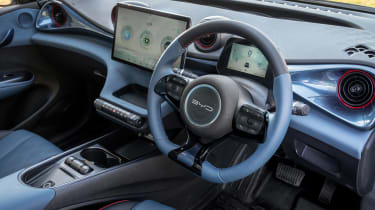
|
Pros |
|
| Cons |
|
Some of the Dolphin test cars we’ve tried have come with fantastic blue and red interior colours, but BYD isn’t offering these designs to UK customers. Your only choices are a more grown-up black and grey or black and brown colour scheme. We like the top-spec Design model’s panoramic sunroof because it helps to keep the interior from feeling too dark.
It’s also worth noting that some of our road testers found the front seats to be an odd shape. The headrest, which isn’t adjustable, seemed to be pushed too far forward, requiring the backrest to be adjusted to an uncomfortable position to compensate for this. It might be an issue for some buyers, so try before you buy.
Interior and dashboard design
The materials inside aren’t any more premium than rival models like the Renault 5, but BYD has done a great job of making them look attractive. Even in places where hard plastic is used, the texture looks like denim. The cabin has some physical buttons, but they’re not as comprehensive as we’d like. For example, the climate system is controlled through the touchscreen.
Materials and build quality
While the materials look good, they’re of similar quality to more budget-oriented family EVs like the MG4 and Renault 5 when you look closer, and the build quality is about the same as well. You’ll find the cabin of a Peugeot E-208 is a bit more luxurious, even though it’s a smaller car.
Infotainment, sat-nav and stereo
The big selling point of the BYD Dolphin is its 12.8-inch touchscreen infotainment system. It has a fun gimmick: you can press a button to rotate the entire screen from portrait to landscape at any time. It’s not all that easy to come up with a reason why this is useful, but it’s a good party trick.
The system is easy to use because the large screen is clear and responsive to inputs. There are climate controls within relatively easy access, but we prefer to have actual buttons for making small adjustments instead of fiddling with a screen, which can be distracting while driving.
Standard features include a DAB radio, Bluetooth, 4G connectivity for ten years, sat-nav, voice control, Apple CarPlay and Android Auto. A wireless phone charging pad is only fitted to Design spec cars, but there are USB-C ports in the front and rear for charging devices.
“BYD has tried to be a little creative with the interior materials. Much of the dashboard and door panels is covered in a soft neoprene-type material, and even where there is hard plastic, its texture imitates denim, so it doesn’t look so cheap at a distance.” - Alex Ingram, chief reviewer.
Boot space & practicality
|
Pros |
|
| Cons |
|
The BYD Dolphin is a five-door family hatchback, about the size of a Volkswagen Golf. Some of its key electric rivals are the Renault 5, Volkswagen ID.3 and MG4, as well as more SUV-like options like the Fiat 600e.
All versions are the same size no matter which trim you pick because there’s no raised-up SUV-lite version or lowered sporty model in the range. Boot space also stays the same regardless of your chosen trim, and the battery packs don’t compromise interior space.
Dimensions | |
| Length | 4,290mm |
| Width | 1,770mm |
| Height | 1,570mm |
| Number of seats | 5 |
| Boot space | 345 litres |
Dimensions and size
The BYD Dolphin is 4.3m long, 1.77m wide and 1.57m high, so it’s actually bigger than a Fiat 600e SUV. It’s also slightly longer and taller than a Volkswagen ID.3, but not quite as wide. It may be one of BYD’s smallest cars, but it’s bigger than the Peugeot E-208 and Vauxhall Corsa Electric, which are both more cramped inside.
Driving position, seats & space in the front
The front seats are an odd shape, and some of our testers found them to be a bit uncomfortable, so you should sit in them before you buy a Dolphin to check if they work for you. There’s plenty of space up front for two adults.
Seats & space in the back
The Dolphin’s back seats are comfortable, with lots of legroom and headroom, so it’s ideal for families. Kids will have no issues fitting in the back seats, and even adults will find it pretty roomy. Three ISOFIX child seat mounting points are standard, so finding a position for a car seat will be no problem. There's one on the front passenger seat and two on the outer positions of the rear bench, and the fixing points in the back are easy to locate through large plastic openings.
Boot space
The BYD Dolphin has a 345-litre boot with the rear seats in place, which can be expanded to 1,310 litres with the 60/40 split rear seats folded down. This is quite a bit smaller than the Volkswagen ID.3, which is considered one of the less roomy cars in its class. Combine this with a high load lip, and carrying a large buggy could prove rather tricky. If you opt for a rival like the Renault Megane E-Tech, you’ll find a much more spacious boot.
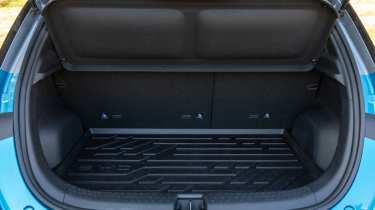
“The practicality was fine, with plenty of room inside for me, my wife and our 10-year-old daughter. And when we shared lifts, we were able to get three kids across the back seat easily.” - Andy Pringle, chief sub-editor.
Reliability & safety
|
Pros |
|
| Cons |
|
The BYD Dolphin and the BYD brand are yet to appear in the Driver Power customer satisfaction survey. We’ll have to wait to hear more from owners about what it's like to run a Dolphin, so if you buy one after reading our review, please submit your experiences to our survey to help future owners out.
We do know that safety isn’t a concern, though, because all versions of the Dolphin come with plenty of kit; you don’t need to upgrade to a high-spec model to get all the latest tech. A 360-degree camera with parking sensors is standard, along with lane-keeping assist, blind-spot monitoring and autonomous emergency braking (AEB). You also get traffic sign recognition and speed limit assist technology on all models.
Euro NCAP gave the Dolphin a five-star rating in 2023, scoring 89 for adult protection and 87 for child protection. Safety assist was rated at 79, which is a little behind the Smart #3, which was tested at the same time.
| Key standard safety features |
|
| Euro NCAP safety ratings |
|
Buying and owning
Our best buy: BYD Dolphin Design
The BYD Dolphin’s pricing is competitive enough that we’re willing to say “go for it’ in regards to the range-topper. For a fairly small outlay compared to the Comfort model, the Design brings some useful extra kit such as ventilated seats, wireless charging and a panoramic roof.
BYD Dolphin alternatives
The BYD Dolphin is one of the brand's smallest models, below the BYD Atto 3 SUV and BYD Seal saloon. It’s a hatchback and uses electric power only, so it’s a rival for models such as the Citroen e-C4, Renault 5, and Volkswagen ID.3, as well as higher-spec versions of electric superminis like the Peugeot E-208 and Vauxhall Corsa Electric. The MG4 is another hatchback EV that’s focused on value, and it’s worth considering if you fancy something a bit sharper to drive than the Dolphin.
Latest deals on the Dolphin and rivals
BYD Dolphin long-term test
Our chief sub-editor, Andy Pringle, lived with the BYD Dolphin for six months as part of our long-term test fleet. Andy was quickly impressed by the BYD's practicality, technology and low starting price, and this combination convinced him that the brand’s future in the UK is a bright one.
BYD’s battery expertise was evident in the Dolphin, too, with Andy managing to achieve over 200 miles of real-world range between charges. You can read the full long-term test here…
BYD Dolphin pictures
Frequently Asked Questions
BYD offers a long, six-year warranty that covers all the usual things, plus the batteries have a longer period of cover than many of its rivals which protects against loss of capacity. The mileage limit is given in kilometres (150,000km), which converts to just under 100,000 miles.
New & used BYD Dolphin deals

